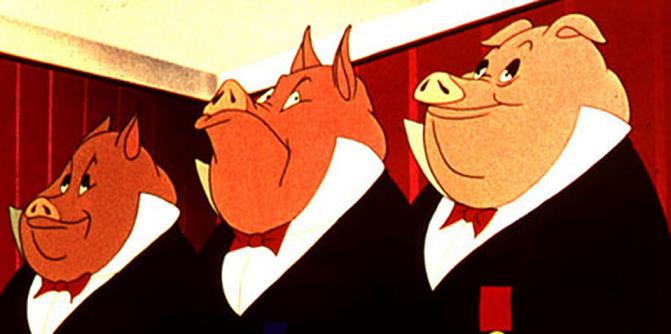Though I loved 1984, I always viewed Animal Farm with trepidation. The notion of a slew of talking mammals simply did not appeal to me. I had visions of Milo and Otis or Charlotte’s Web. The actual story of George Orwell’s second most famous piece – the thinly-veiled communist dystopia – is nothing flowery or trite, but you never really hear about that factor. Still, despite the serious overtones mixed with quadriped masks, Animal Farm never matches the effulgence of its Big Brother.
For all intents and purposes, Animal Farm and 1984 are the same story. Orwell’s animals seem to be the stepping stone for his more polished, fleshed-out master stroke. Animal Farm is the lean morality play, stripped of language and subtlety. Both tales show the movement of supposed revolution toward supposed utopia. In Farm, we see the communist swath from start to finish, from noble idea to washed-out greed-fest. 1984 injects the human interest, the reaction to the story. Where 1984 muses on what it might be like to discover the authoritarian ruse and push against it, Animal Farm is the blunt punch in the face about how that authoritarian ruse comes to be. It is effective, but nothing more.
Orwell certainly held a creative touch for plotmaking and intricate detail. The momentum of the story from incident to incident is genius, but Orwell stops himself at that point. If you enjoy philosophical musings or wise ruminations, Animal Farm will leave you in a void. When viewed as a stepping stone toward 1984, however, the work’s existence is much more palatable.
When the final pages were turned, I found my experience with this book to be somewhere in the middle of my expectations. It was not the kid story I often conjured internally, nor was it on a level with the transcendence of 1984. In future, potential canons, seemingly Animal Farm will always take a back seat to its more muscular, sophisticated cousin, even if it came first.
mith rating: 7.6/10
Animal Farm was rated #31 on the Modern Library’s Top 100 Novels of the 20th Century. I read it as part of the Top Project.
